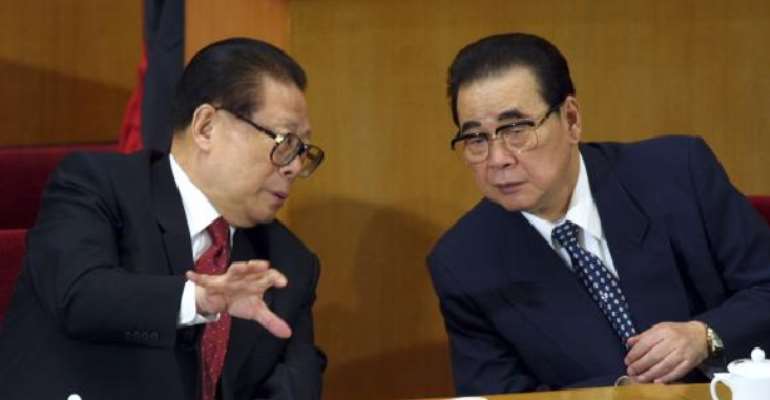China Bristling, Spain Seeks To Limit Its Judges' International Rights Powers

CHINA'S PRESIDENT JIANG ZEMIN (L) TALKS WITH TOP LAWMAKER LI PENG, CHAIRMAN OF THE NATIONAL PEOPLE'S CONGRESS, DURING THE OPENING CEREMONY OF THE CHINESE PEOPLE'S POLITICAL CONSULTATIVE CONFERENCE (CPPCC) AT THE GREAT HALL OF THE PEOPLE IN BEIJING Spain's parliament will debate a bill on Tuesday to limit the power of judges to pursue international human rights cases, a day after Spanish arrest orders were issued for former Chinese officials accused of genocide in Tibet.
China protested against the orders, called on Spain to drop the issue and issued a veiled threat about ties between the two countries.
Spanish law currently recognizes universal jurisdiction, the concept that crimes against humanity can be prosecuted across borders.
Spanish judges have caused diplomatic friction in the past as they have sought to question or detain officials from Chile, the United States, China and Israel in cases involving alleged genocide, torture or rights abuses.
The bill, submitted to parliament by the ruling center-right People's party last month as the Tibet case was gathering force in the courts, would restrict judges from acting on such cases unless the alleged wrongdoers were Spaniards or resident in Spain.
The main opposition group, the Socialist party, signaled it would vote against the proposed changes.
But the PP has an absolute majority in parliament.
Spanish High Court Judge Ismael Moreno issued arrest orders on Monday for former Chinese President Jiang Zemin, ex-Prime Minister Li Peng and three others.
They are accused of genocide in Tibet, which Chinese troops took control of in 1950 and is now viewed in China as an integral part of the nation.
China says it "peacefully liberated" the Himalayan region, which it says was mired in poverty, exploitation and economic stagnation.
The Spanish case - brought eight years ago by Tibetan groups in Madrid and a Tibetan monk who has Spanish nationality - would be impossible to pursue if the rules were changed as the PP proposes.
A spokesperson at Spain's national police declined to say when police would act on the order and request an Interpol "red notice," an arrest request which could then take hours, days or weeks to be published internationally.
China's Foreign Ministry said on Tuesday the judge's ruling was a "wrong decision.
" China hopes Spain can "appropriately deal with' the issue, spokeswoman Hua Chunying said at a daily news briefing.
"Whether or not this issue can be appropriately dealt with is related to the healthy development of ties," she said.
China is not a major trade partner for Spain and a number of Spanish banks and telecommunications companies have cut back on investments in China in recent years.
But Spanish officials have wooed investment from China, both in industry and in sovereign debt.
RIGHTS CASES Spain has been a pioneer in pursuing international human rights cases and groups in Spain and abroad have spoken out against changes to the law.
"This initiative would mean a considerable step backward and hinders Spain's commitment to the universal human rights system," Amnesty International said in a statement on the bill before parliament.
One of the most publicised case that Spanish judges have prosecuted under universal jurisdiction was that of former Chile strongman Augusto Pinochet, who was arrested in London in 1998 on a warrant issued in Spain.
Spanish ex-judge Baltasar Garzon tried to get Pinochet extradited to Spain for trial, but he was eventually returned to Chile for health reasons and Chile's justice system was pursuing human rights cases against him.
In another case, which caused friction with the United States, a Spanish judge sought to question U.
S.
military officers over the death of Spanish cameraman Jose Couso who died when a U.
s.
tank fired on a hotel housing journalists in the Iraq war in 2003.
REUTERS
